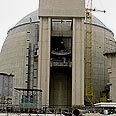
US: Iran nuclear weapons program stopped in 2003
US intelligence report counters majority opinion, claims Tehran froze its nuclear program four years ago due to international pressure. White House rushes to emphasize that newfound information won't hamper efforts to tighten sanctions on Iran. Meanwhile Chinese banks restrict trade credit to Iranian firms. US announces Beijing has agreed to discuss tightening sanctions
Iran halted its nuclear weapons development program in the fall of 2003 under international pressure but is continuing to enrich uranium, which means it may still be able to develop a weapon between 2010 and 2015, senior intelligence officials said Monday.
That finding, in a new National Intelligence Estimate on Iran, is a change from two years ago, when US intelligence agencies believed Tehran was determined to develop a nuclear capability and was continuing its weapons development program. It suggests that Iran is susceptible to diplomatic pressure, the officials said.
''Tehran's decision to halt its nuclear weapons program suggests it is less determined to develop nuclear weapons than we have been judging since 2005,'' states the unclassified summary of the secret report, released Monday.
Officials said the new findings suggest that diplomacy has been effective in containing Iran's nuclear ambitions, although President Bush's national security adviser, Stephen Hadley, said the risk of Iran acquiring a nuclear weapon remains ''a serious problem.''
The estimate suggests that Bush ''has the right strategy: intensified international pressure along with a willingness to negotiate a solution that serves Iranian interests, while ensuring that the world will never have to face a nuclear armed Iran,'' Hadley said.
The finding comes at a time of escalating tensions between the United States and Iran, which Bush has labeled part of an ''axis of evil,'' along with North Korea and President Saddam Hussein's Iraq. At an Oct. 17 news conference, Bush said ''if you're interested in avoiding World War III, it seems like you ought to be interested in preventing them (Iran) from having the knowledge necessary to make a nuclear weapon.''
The halt to active weapons development is one of the key judgments of the latest intelligence estimate on Iran's nuclear program. National Intelligence Estimates represent the most authoritative written judgments
of all 16 US spy agencies.
Despite the suspension of its weapons program, Tehran may ultimately be difficult to dissuade from developing a nuclear bomb because Iran believes such a weapon would give it leverage to achieve its national security and foreign policy goals, the assessment concluded.
US, China agree on basis for more sanctions
Meanwhile this past week, Iranian traders have faced difficulties in opening letters of credit with Chinese banks, restricting a key instrument in trade that could harm business ties, an Iranian official was quoted as saying.
China has become an increasingly important trading partner with Iran as expanding UN and US sanctions have encouraged Western firms particularly to scale back dealings with the Islamic Republic.
Beijing has been resisting moves to further penalise Iran but the US said on Monday it had agreed with China on the basis for more UN sanctions to push Tehran to halt nuclear works.
Asadollah Asgaroladi, head of the Iran-China chamber of commerce, was quoted as saying that Chinese banks "did not open letters of credit for Iranian traders during the past week."
"Chinese banks did not give any reason for the move and if this trend continues it will harm the two countries' economic cooperation and trade exchange," he said in remarks reported first by ISNA news
agency.
He did not name any of the Chinese banks. Asgaroladi could not be reached for comment on Monday.
A Chinese source who follows Iranian-Chinese commercial ties said there had been no official Chinese announcement on financial limitations on Chinese banks doing business with Iran.










